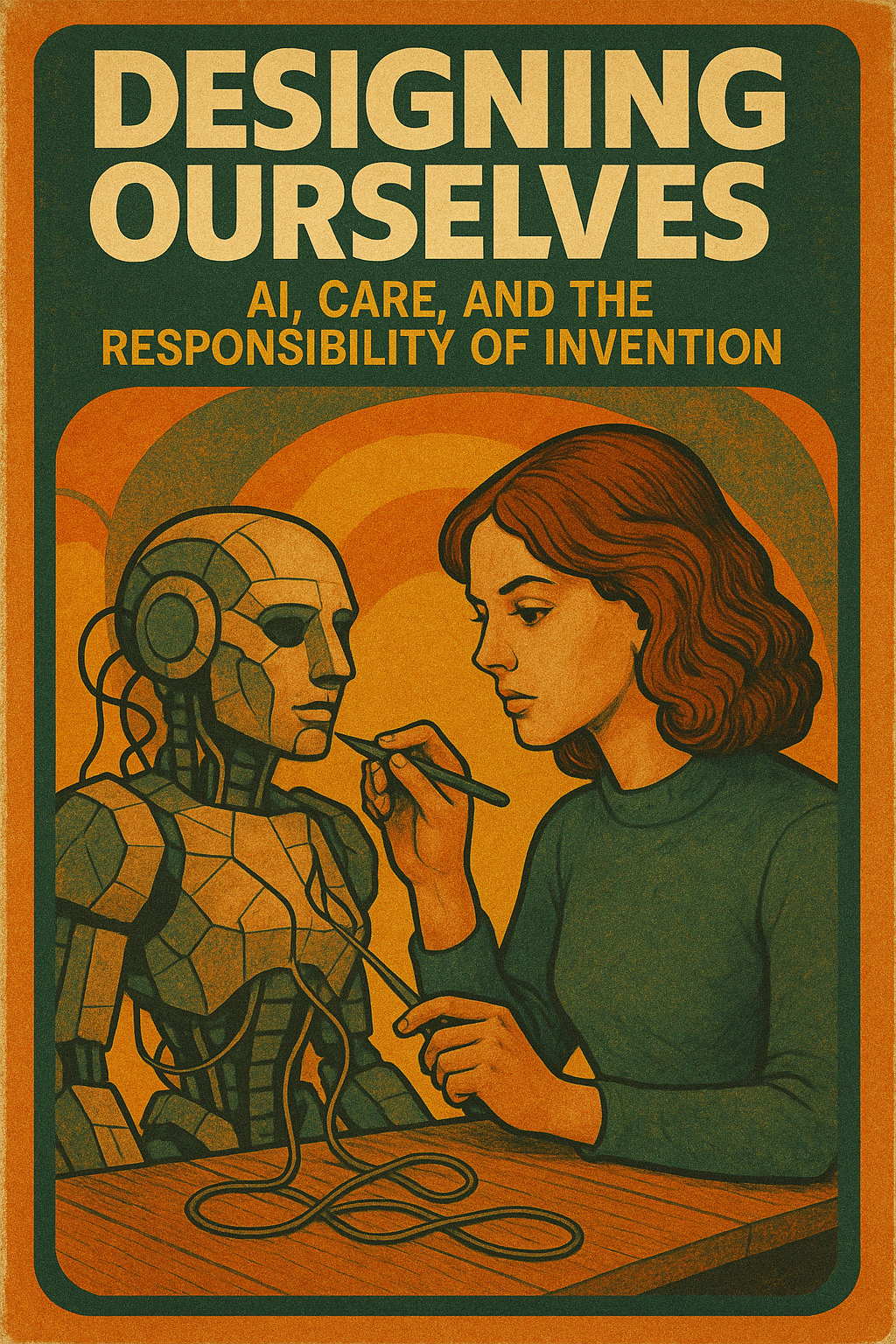Designing Ourselves: AI, Care, and the Responsibility of Invention
It is up to us to create the practices, skills, and habits for using AI in ways that enhance rather than enfeeble our capacities to care.

This week's post introduces another blog that I recently co-founded as part a new initiative called Curiosity Craft. I plan to get back to my Heidegger series here in the next couple of weeks.
Our world is becoming more and more crowded with AI-powered tools. Anxiety abounds. A much-discussed article in New York magazine this week, “Everyone is Cheating their Way Through College,” puts substance to some of these fears, especially around the fate of college education.
The ways we have imagined and designed education now belong to a bygone world. The question of how we can best adapt our practices of education and learning is among the most urgent of our times.
A recent episode of the “Your Undivided Attention” podcast from the Center for Humane Technology provides tremendous food for thought on these issues. The episode is called “Rethinking School in the Age of AI,” featuring a fascinating conversation between cognitive neuroscientist Maryanne Wolf and global education expert Rebecca Winthrop.
Here is one way to put the challenge before us. AI has entered our lives through conversational technologies that we can interact with in everyday language. This means that these tools can both enhance and impair the powers that language grants us.
Language is at work in how we think, learn, connect with each other, create communities, understand our emotions, and imagine our futures. These AI-powered tools thus have the potential to reshape the fundamental skills and capacities that make us human.
The skills and practices for how to live well with AI-tools have not yet been invented; how can we use these tools in ways that expand rather than impair our connectedness, communication, creativity, intuition, autonomy, and capacities to care?
The invention of these skills for how to be human in the age of AI is not something we should just leave to governments or big tech companies; it is a collective task, our shared responsibility.
Thinkers, tinkerers, caregivers, parents, artists, educators, citizens—all of us have a role to play in crafting a future in which these technologies serve the cultivation of of our capacities to care.
This is the spirit behind Curiosity Craft, a new project I’ve launched with my friend and colleague Massimo Scapini.
Curiosity Craft aims to create a community of practice gathered around these concerns. In particular, we aim to support older generations (especially but not only parents) guide the children in their lives to have a positive relationship to AI and technology; to use AI to connect with each other and the world in curiosity and wonder.
This is an invitation to a communal remaking our relationship to technology not by retreating from it, nor by surrendering to it, but by using it tap into the fundamental wonder, care, and creativity at the heart of being human.
We begin from a simple premise: that AI used with care can feed curiosity, connection, and creativity rather than suppress them; it can deepen relationships and conversations rather than replacing them. Though of course, AI also threatens to enfeeble these most important human capacities if we go wrong here.
This historical moment requires the invention of new practices: shared forms of attention, learning, inquiry, conversation and play that allow both children and adults to explore the new possibilities opened up by AI tools.
We have a responsibility to those who will inherit the systems we are now building: our children, our students, our unimagined distant ancestors in this weird and wondrous adventure of being human.
This is why Curiosity Craft centers its attention parents and caretakers whose concern for their children can become the wellspring of new habits and new possibilities for how we live with AI.
When a father, or mother, or uncle (like me) exemplifies how to use technology in a way that sparks wonder and connection rather than to feeding distraction or isolation, we are already participating in the slow, uncertain work of world-making. It is partially from these small, daily practices, anchored in care, that a different future can begin to grow.
So, it is in this spirit that I would like to share with you now a blog post written by my Curiosity Craft colleague Massimo Scapini and posted earlier this week to our Curiosity Craft blog: "Raising Humans in the Age of AI Education."
Please follow our Curiosty Craft blog and enter your email address into our sign-up to stay up to date about what we are up to with this project.
Raising Humans in the Age of AI Education
Curiosity Craft blog, May 07, 2025
The pace at which AI is becoming part of how we raise our children is accelerating. Just in May 2025, both China and the United States announced new initiatives to make AI education mandatory in schools. On top of that, Google revealed it is preparing to release a version of its AI tools designed specifically for children under 13. These shifts point to a future where AI is not just a tool but a presence in the daily lives of our children, woven into their learning, their play, and their questions about the world.
For many, this feels like a turning point. Not just because AI is becoming part of the curriculum, but because the speed and scale of these initiatives reveal a deeper truth: this technology is no longer optional. It will shape the tools our children use, the jobs they pursue, the way they find answers and the way they discover their own paths.
So where does that leave us, the parents?
Some will feel relief. Let the experts handle it. Let the systems adapt.Others will feel unease. What does “AI education” even mean? Who decides how it's taught? And what happens when machines become the first to answer our children’s questions?
These are not easy questions. But they are the right ones.
The Illusion of Control vs the Practice of Agency
We are often told that the future is uncertain, that the pace of change is too fast to predict. This can leave parents feeling powerless. But there is a difference between lacking control and lacking agency.
Control is about prediction, command, and certainty. Agency is about authorship, response, and care. Rather than aiming at guaranteed outcomes, agency seeks to shape the path by how we walk it.
AI is entering our homes through homework, apps, or machines that talk back. It arrives with the promise to be useful. It raises the question, however, of whether we will still be engaged and present. Whether we will still be listening, still be asking the second question, still be revealing what it means to make sense of the world, not just compute it.
The First Line of Action Is at Home
Governments may standardize AI learning. Companies may push new tools into classrooms. But the first line of response does not begin there. It begins with parents.
In the home, we still have room to shape the culture around AI. We can invite curiosity instead of compliance and consumption. We can model discernment over distraction. We can ask what kind of people we want our children to become, not just what kind of tools they will learn to use.
Rather than turning away from technology, this moment invites us to step more deeply into our role as shapers of its meaning. We have the chance to guide how AI enters our homes, how it is received by our children, and how it reflects the values we want to carry forward.
Tinkering as a Practice of Agency
One way to stay present is through tinkering. Approach new tools with the mindset of an explorer, in an openness of discovery shared with your child. Try something unfamiliar together. Ask your child what they think of an AI’s answer. Compare it to your own. Let them see you wonder. Let them see you squirm and disagree. Let them see you choose.
This kind of joint exploration invites us to step away from the pressure to know everything and instead to foster matters like curiosity, conversation, and the willingness to seek meaning together.
What We Can Be
A child born in 2025 will never know that:
- Creating professional images required advanced design skills
- Coding was something done almost exclusively by engineers
- Cameras were a requirement for making videos
- Composing music was a privilege gained by years of embodied skills
- It was difficult to communicate with people that spoke other languages
- There was a time when humans did not have conversations with machines
But they can grow up in a world where humans still speak, explore, and build with each other.
We may not be able to control the future. But we can still be the people who listen well. Who stay curious. Who name what matters. Who refuse to offload the work of making sense to the machine.
And if we are that, if we can be that, then our children may grow up knowing that technology was not what raised them. We were.
I also invite my Without Why readers to check-out a previous post from our Curiosity Craft blog that also focused on how new AI-powered tools are transforming learning and education. As one of the contributors to the Dreyfus Model of Skill Acquisition (As I explained in a previous post, I am the author that Wikipedia page), it is fascinating to witness how AI is bringing forth new ways for developing skill and intuition in unfamiliar domains (hence the phenomenon of "vibe coding.")
I would love to hear any feedback, responses, questions, or comments upon any of this. Please leave a comment or send me a message. Thank you!
Join the Conversation
Your support makes Without Why possible. If you upgrade to a paid subscription for as low as $8 per month you gain the opportunity to post and reply to comments on these pages, and to join a growing community of conversation here. You will also receive extra-special members-only posts. Sign up today!
